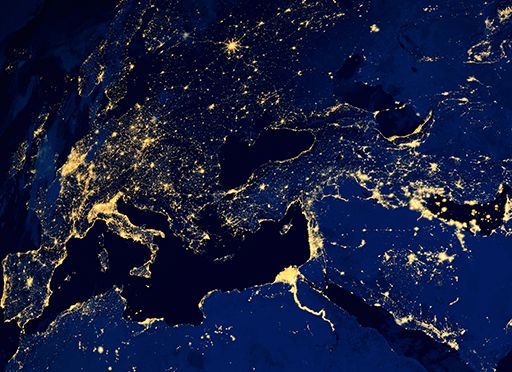Renowned experts Daron Acemoğlu and James A. Robinson parse why and how some nations endure and others vanish.

Equality Nourishes Nations
Daron Acemoğlu, an economist at the Massachusetts Institute of Technology, and James A. Robinson, a political scientist and economist at the University of Chicago, recognize that whether you’re from a wealthy or impoverished nation, you probably wondered why your country inhabits its place in the international hierarchy. Culture? Natural resources? Luck? Acemoğlu and Robinson offer a compelling and, ultimately, hopeful assessment of why certain nations enjoy economic primacy.
The authors are recognized as among the foremost authorities in the world in their field. Accordingly, The Wall Street Journal called this, “a splendid piece of scholarship and a showcase of economic rigor.” The New York Review of Books wrote, “Should be required reading for politicians and anyone concerned with economic development.”
The Atlantic, however, expressed reservations. Its reviewer felt the authors place too much emphasis on “economic domain [and] property rights,” and thus excluded the impact of policy upon – and the ability to shape that policy of – those who lack property and thus, have no property rights. He agrees with the authors that democracy is the most potent assurance of an equitable society, but calls them out for not including in their calculus the ability of special interest groups within democracies to siphon off resources and thus extend inequality.
Disparity
Acemoğlu and Robinson tell you that residents on the north side of the city of Nogales have education, health care, and law and order. The average income is about $30,000 a year. Residents of the south side of Nogales make about a third of that. Most do not graduate from high school and have limited access to health care. Authorities are corrupt, businesses must offer bribes, and residents know that whatever they acquire through hard work, crooks or the government will steal.
Economic institutions shape economic incentives: the incentives to become educated, to save and invest, to innovate and adopt new technologies, and so on.Daron Acemoğlu and James A. Robinson
Residents of north and south Nogales share a common culture, common ancestors and common history. So, Acemoğlu and Robinson ask: Why the disparity? Nogales straddles the border between Mexico and the United States, and the governing institutions on either side are starkly different. These institutions, Acemoğlu and Robinson posit, are responsible for persistent inequality.
World Inequality
Many wealthy nations, the authors note, have a temperate climate, while poor nations have subtropical climes. But this does not explain, for example, how the Aztec and Incan empires mounted highly advanced civilizations in temperate climates. Or, Acemoğlu and Robinson suggest, consider modern examples such as the borders between the United States and Mexico or North and South Korea. These areas have similar climates and people, but stark contrasts in equality.
If ignorance were the problem, well-meaning leaders would quickly learn what types of policies increased their citizens’ incomes and welfare, and would gravitate toward those policies.Daron Acemoğlu and James A. Robinson
Acemoğlu and Robinson note that when China was extremely poor, foreigners said Confucianism and other Chinese cultural qualities kept it from achieving economic prosperity; but, now, experts say China’s unprecedented economic growth stems from its cultural values.
Extractive Institutions
Extractive economic institutions, the authors explain, pull wealth from one segment of society for the benefit of another. For instance, forced labor in Latin and South America under Spanish colonizers and the implementation of apartheid in South Africa are both extractive institutions established by outsiders. But, Acemoğlu and Robinson remind readers, elite local minorities often establish and maintain similar institutions.
Inclusive institutions encourage and enable a nation’s citizens to engage in economic endeavors that suit their interests and abilities. Such institutions, the authors say, result in broader distribution of resources, empowering average people and dispersing political power among different groups.
Economic institutions that create incentives for economic progress may simultaneously redistribute income and power in such a way that a predatory dictator and others with political power may become worse off.Daron Acemoğlu and James A. Robinson
A politically and economically inclusive society helps people defend their property rights, regardless of their position in society. Such societies also provide public services that enhance quality of life, such as sewage systems, streetlights, roads, health care and education. As the authors report, these services reduce the barriers to economic activity and encourage growth.
The Americas
In the early 1600s, Acemoğlu and Robinson explain, the Spaniards extracted labor and resources from South and Latin Americans. The Virginia Company, attempting to do the same in its American colonies, found the native people resistant to slavery. So, the authors divulge, the Virginia Company tried to force its colonists into serf-like subservience, instituting “Lawes Divine, Morall and Martiall” limiting colonists’ movement and activities.
Critical junctures are important because there are formidable barriers against gradual improvements, resulting from the synergy between extractive political and economic institutions and the support they give each other.Daren Acemoğlu and James A. Robinson
Colonists in Virginia, and those in Maryland and Carolina, balked. They could, the authors detail, live with Native Americans or strike out on their own in a massive, sparsely populated, wild country. In 1619, Maryland settlers received their own land, and the state granted land-owning men a say in its General Assembly. Acemoğlu and Robinson view this moment in history as a “critical juncture”: the moment of a sharp change in a nation’s future course.
Democracy Wins
This is a rich, complex, multilayered, fastidiously researched tome. The authors write for what they perceive to be a general audience, but their material will resonate most strongly with political scientists, historians, economists and those whose interest in history is macro, not micro. Acemoğlu and Robinson twine many threads to create their tapestry. Their final heartfelt conclusion is that even though empires once endured, the nations that thrive today and will thrive tomorrow are those that vest the most in democracy, equality and sharing of resources. All others, the authors believe, will fail.
Daron Acemoğlu and James A. Robinson also co-authored The Narrow Corridor and Economic Origins of Dictators and Democracy. Acemoğlu also wrote Introduction to Modern Economic Growth. Other intriguing overviews of the processes of civilization and politics include Guns, Germs and Steel and Collapse by Jared Diamond and Civilization by Niall Ferguson.






